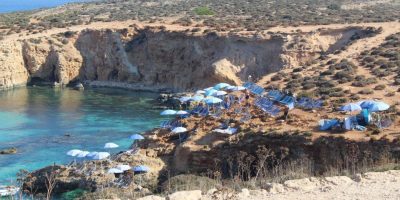Addis Ababa — “There is no logic in asking us to pay such amounts when we fled a war.”
Sudanese refugees living in Ethiopian cities are being driven deeper into poverty because of government-imposed visa fees that are beyond their means, and some have even been arrested for failing to pay the monthly charges and arrears.
Ethiopia requires Sudanese who want refugee status to live in designated camps – where they don’t have to pay visa fees – but had previously offered visa exemptions to those who decided to live in urban areas where there is less insecurity.
However, these exemptions were halted last October, forcing thousands of refugees living outside the camps to start paying $100 every month to renew their visas, and an additional $10 per day in fines if they miss the payment.
“The police regularly arrest Sudanese people and throw them in jail because they haven’t paid the monthly fees,” one refugee*, who hasn’t been able to pay the charge since entering Ethiopia last July, told The New Humanitarian.
A high school teacher in Sudan, the refugee said she relies on her son in France to pay for the modest hotel room she shares with her daughter. Since hearing about the monthly fees, she said she avoids going outside.
Sudan’s war – which pits the paramilitary-turned-rebel Rapid Support Forces (RSF) against the regular army – erupted in April 2023, and has produced the world’s largest hunger and displacement crises.
According to the UN, more than 12.3 million people have been uprooted by the violence, of whom 3.5 million have crossed borders into neighbouring countries, mainly Chad, Egypt, and South Sudan.
Since the beginning of the war, some 163,000 people from Sudan – including 85,000 Sudanese nationals – have arrived in Ethiopia, which is home to the second-largest refugee population in Africa, hosting over a million people.
Ethiopia has been widely commended for allowing so many refugees into the country, yet it has several policies that are harmful to the refugee population, and it is also embroiled itself in a number of destructive and deadly internal conflicts.
Sudanese refugees in camps have faced dire humanitarian and security conditions, especially in the Amhara region, where local militias have subjected them to attacks, abductions, and rapes. Some refugee settlements have closed as a result.
Meanwhile, urban Sudanese refugees, who are thought to number around 15,000, lack legal protection and can face deportation or detention by government institutions, especially now that they face the steep visa fees.
“They won’t have access to essential services like healthcare, education, or work opportunities, and may be vulnerable to exploitation,” Tarik Argaz, a communications officer for UNHCR in Ethiopia, told The New Humanitarian.
“I try to feed myself. That is my only concern”
Sudanese wanting to apply for asylum are supposed to register on arrival in the Ethiopian border towns of Metemma and Assosa. Once registered, they are then required to settle in UN-run camps allocated by local authorities.
Those wishing to live outside the camps can request a permit from the government’s Refugees and Returnees Service, yet these can be hard to obtain because applicants must have a local sponsor or prove their ability to support themselves.
Many of the urban Sudanese refugees therefore don’t have refugee status nor the hard-to-obtain residence permits. That means they are required to constantly renew their visas, even though few can actually afford it.
A 25-year-old homeless Sudanese refugee who has been living in Addis Ababa since last April said he can only focus on his daily survival out on the streets and is terrified of encountering the Ethiopian security services.
When he arrived in Ethiopia, he was working for a design company that wanted to fly him to its offices in Mauritania. But he said he was robbed last year of his phone and laptop, which stopped him from working and resulted in his contract being terminated.
A single mother who crossed the Ethiopian border with her four children in June 2023 said she is also unable to pay the visa fees because she is focused on more essential things.
“I try to feed myself. That is my only concern,” she told The New Humanitarian. “I haven’t paid my rent in two months, but the landlord knows I’ll repay him when I have the money,” she added.
A makeup artist in Sudan, the woman said she does small informal jobs to feed her children, from henna hand art to serving tea and snacks in the courtyard of a restaurant run by a Sudanese-Ethiopian couple.
A Sudanese mathematics professor who has sought refuge in Addis Ababa said he owes so much money to the Ethiopian government that he cannot afford to travel to another country, which is trapping him in a vicious cycle.
The professor said many Sudanese refugees in the capital are facing a tough time, with some youth even turning to crime to make ends meet. “They are willing to do anything in exchange for a meal or a small sum of money,” he said.
Detained refugees
Arrests of Sudanese who have not renewed their visas are common, according to Hassan Tawakol, a Sudanese academic who is raising funds in Addis Ababa to pay for the bail of detainees.
Tawakol sent The New Humanitarian a list of 12 Sudanese refugees he said have been detained since the beginning of February, all of them incarcerated in the capital.
A diplomatic source in Addis Ababa, who asked not to be named to speak freely, said Sudanese embassy officials had requested an extension to the original visa fee exemption and that the Ethiopian authorities had promised to grant one.
The official said they were unsure if the government had fulfilled its pledge because of “a lack of will” or for political reasons, which could be linked to Ethiopia’s fractious recent relations with Sudanese authorities.
A Sudanese journalist in Addis Ababa said he was stopped last year by security services in civilian clothing and was imprisoned for two months because he hadn’t reviewed his visa for more than half a year.
The journalist said he shared a cell with around 40 detainees, including seven Sudanese refugees who all owed money to the Ethiopian government’s Immigration and Citizenship Services agency.
He said he was released but has arrears amounting to $1,200 and fears being arrested again. “There is no logic in asking us to pay such amounts when we fled a war,” he said. “The Ethiopian government is simply looking for money.”

Sign up for free AllAfrica Newsletters
Get the latest in African news delivered straight to your inbox
Success!
Almost finished…
We need to confirm your email address.
To complete the process, please follow the instructions in the email we just sent you.
Error!
There was a problem processing your submission. Please try again later.
A second Sudanese refugee journalist said the visa fees are supposed to be paid in dollars, which complicates matters further for those who already cannot afford to pay.
“To obtain dollars, I must go through the black market, which is by definition illegal,” the journalist said. “The police can arrest me if they find dollars or any other hard currency in my pocket.”
Fears of returning
Despite the difficult situation they are facing – and recent advances by the Sudanese army against the RSF – the refugees who spoke to The New Humanitarian said they are not considering returning to Sudan anytime soon.
“I abandoned my home in Khartoum,” said the single mother living in Addis Ababa with her daughter. “I have nowhere else to live. Moreover, rents have become exorbitant in cities controlled by the army.”
The young man living on the streets said his family members in Sudan are internally displaced and facing dire conditions he would not want to experience.
“My father lost his teaching job because schools are closed,” he said. “There is no work, no services, no network, no electricity there. And as a young man, it would be very dangerous for me to return to Sudan. I could be forced to take up arms.”
*The names of all refugees are being withheld given the risks they face.
Edited by Philip Kleinfeld.


















